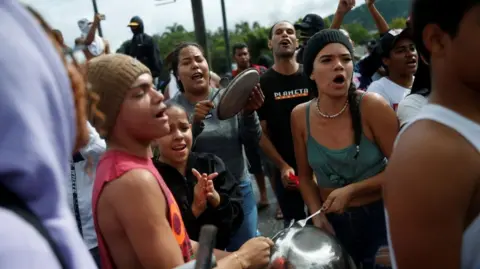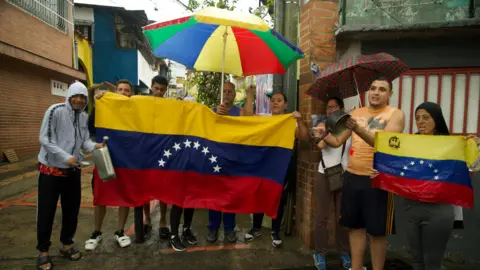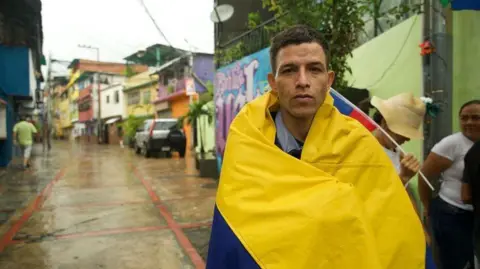 Reuters
ReutersPeople in Caracas are banging pots and pans in their homes and on the streets to protest Venezuelan President Nicolas Maduro’s claim of victory in a disputed election.
Many people are walking towards Miraflores (the presidential palace) as part of the protest.
People are walking out of slums around the city.
A group stood outside in the pouring rain, banging pots and pans and chanting “Afuera” (out) and “Libertad” (freedom).
Others posted photos of the crowd on social media with captions such as “Down with the dictator” and “Everyone to Miraflores.”
The footage showed tires burning on the highway and crowds of people walking and riding bicycles on the street.
The opposition disputed Maduro’s declaration of victory as fraudulent, claiming that opposition candidate Edmundo Gonzalez won in a landslide with 70 percent of the vote.
The opposition backed Mr Gonzalez in a bid to oust Mr Maduro after 11 years in power, and there was widespread discontent over the country’s economic crisis.
Polls conducted ahead of the election predicted a clear victory for the challenger.
Several international organizations, including the United Nations, and Western and Latin American countries have called on Venezuelan authorities to release voting records from individual polling stations.

The BBC spoke to several people who attended a protest in a densely populated area known as La Lucha (meaning “the fight”).
Paola Sarzalejo, 41, said the vote was “horrible and fraudulent.” We won by 70 percent, but they did it again. They stole the election from us again.
“We want a better future for our youth and our country.”
Her father Miguel, 64, agreed, saying: “He lost the election and he has no right to be there right now.”
He added: “We want a better future for our young people, because otherwise they will leave the country. A country where they can work well and earn well. We have a rich country and he is destroying everything.
“If all the young people leave, Venezuela will only be left with old people. Only old people will be left.”
Cristobal Martinez, draped in a Venezuelan flag, said he thought the election was a “fraud.”
He said most of the young people in La Lucha and surrounding areas voted in this election, which was particularly important for young people because “many of us are unemployed” and “most of us are not studying.”
“It was my first time voting in my life. I was there from 6 in the morning until about 9 in the morning and I saw a lot of people protesting in the streets.
“There was a lot of discontent with the government. Most people were on board with the change.”
He said that despite Maduro’s long tenure, “there has been no change” and that “it has gotten worse since President Chavez died.”
He criticized some seniors who sympathize with the government for relying on bonuses and food assistance to survive, but said, “We want change, we want decent jobs, we want a good future for our country.”
“We hope that other countries will come to our aid and help us so that another disaster like this doesn’t happen again,” Martinez said.

President Maduro accused the opposition of challenging the results and calling for a coup. “What we are facing today is not the first time,” he said.
“They are trying to carry out another coup in Venezuela, this time of fascist and counter-revolutionary character.”
Venezuela’s attorney general warned that anyone blocking roads or violating laws related to obstruction as part of the protests would be severely punished, and 32 people have been detained on charges ranging from destroying election materials to inciting violence.
Meanwhile, senior U.S. administration officials said the published results were “inconsistent with data obtained through rapid counting mechanisms and other sources,” suggesting the results reported may conflict with how people voted.
They added that this is “our biggest concern”.
“That is why we are asking Venezuela’s electoral authorities to release the basic data that supports the numbers they have publicly announced.”
But the United States has yet to say what the results mean for its sanctions policy against Venezuela. Officials have stressed that while there is some doubt about the results, President Maduro held the election and allowed opposition candidates to appear on the ballot, even though the opposition leader was banned from running.

